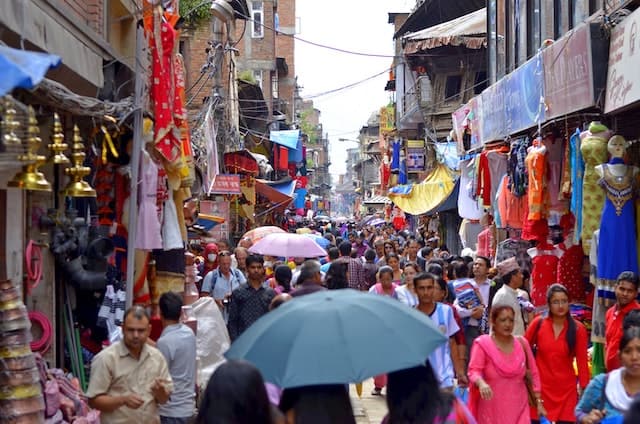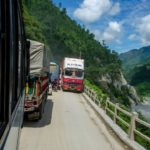This is What It’s Like to Get Your Period in Nepal

For most women, getting your period is not a particularly fun experience, especially when it’s for the first time. Having it while traveling can be even worse. My experience as a volunteer in Nepal opened up a whole new perspective on getting my period, and gave me a glimpse into what it is like to be a woman in this country.
In September 2014, I left the U.S. for a three month trip to volunteer in Nepal with Volunteers For Peace, a nonprofit international volunteer service organization based in Burlington, Vermont. I left Burlington with many ideas and notions about Nepal and the status of women. I was prepared for the big stuff, like women marrying young and girls not having as many opportunities as boys. It turned out, however, that it was the little things in everyday life that were the hardest to get used to, like getting my period.
My host family was pretty modern in the sense that they had a television, cell phones and WiFi, but they had traditional beliefs and were very religious. This became apparent on day one. When I arrived I did not see my oldest host sister for the first couple of days. It turns out that she had gotten her period and was confined to her room until it was over. This was a shocking situation that I was not at all prepared for.
In many places in the world, women’s reproductive health is stigmatized and misunderstood, and often even seen as “dirty”, which is just one of the many root causes of women’s inequality in Nepal.
I found out later that not all families practice this, and it mostly depends on their caste and belief system, but as my family did, I tried to accept it as a part of their culture. That is, until they told me that I was supposed to follow these rules as well.
They explained to me that when I had my period I had to announce it to the family and I was not allowed in the kitchen, or most of the rest of the house for four days. I had to eat all my meals in my room and I was not allowed to touch my younger host sisters, because I could get them “sick.” This is when I really started to question this belief and its purpose. Every time I asked my family to explain it to me they simply replied, “it’s just our culture”.
In many places in the world, women’s reproductive health is stigmatized and misunderstood, and often even seen as “dirty,” which is just one of the many root causes of women’s inequality in Nepal. On a personal level, it feels very degrading, uncomfortable, and lonely. There are some communities in rural areas where girls who are menstruating are forced to stay in a hut by themselves, far away from the house.
She couldn’t sleep with her sisters or with me because all of our things would get “contaminated.”
In the city, I had it easy, but in a village it is dangerous and scary for a girl to get her period. Many girls, including my host sisters, would have to miss up to four days of school a month because of this. Although the experience was uncomfortable for me, I knew that there were many more girls in Nepal who had to live their whole lives with this degrading stigma.
One day, we were all getting ready for dinner when my host sister ran upstairs and announced that her younger sister just got her period for the first time. The whole house sprang into action. My host father went upstairs to pray, my host mother went downstairs to figure out where my sister could sleep, and my oldest host sister ran out to buy sanitary pads from the store. They were all trying to decide how long she needed to stay secluded–it could be anywhere from seven to fifteen days.
The decision was made for her to sleep on the floor in the common area for twelve days. She couldn’t sleep with her sisters or with me because all of our things would get “contaminated.” She was not allowed to see the sun, go to school, or come into contact with any males the whole time.
This is What It’s Like to Get Your Period in Nepal.
During all of this chaos, no one ever asked her how she was feeling, whether she had any questions, if she was nervous, or explained to her what it means when she gets her period. She even had to figure out how to use a sanitary pad by herself. Her friends visited her and dropped off her homework from school, but she was not allowed to play with her little sister or go outside.
Because she went to a private school, was the top student in her class, and had a family who valued education, she would probably bounce back from missing so much school, but there are many other girls who are not so fortunate. This experience allowed me to understand why sometimes, in a country like Nepal, it is the everyday things in a girl’s life that make it harder for her to succeed.
She was not allowed to see the sun, go to school, or come into contact with any males the whole time. During all of this chaos, no one ever asked her how she was feeling, whether she had any questions, if she was nervous, or explained to her what it means when she gets her period.
I was very close with my host family and I appreciate them and Nepali culture in many ways, but this was something I had a hard time accepting. Despite my feelings, I chose to follow these rules in order to keep good relations with my host family, and to be respectful of their customs. It was a good reminder that there are some aspects of certain cultures that are very difficult to accept, no matter how open-minded and culturally sensitive you think you are.
Top photo credit for This is What It’s Like to Get Your Period in Nepal by Unsplash.com.









Hi Maddie,
I really enjoyed reading this article, thank you for sharing your experiences on the blog!
I am very interested into learning more about these cultural practices in Nepal and am starting to consider a volunteering trip to the country to see if I can experience and understand the situations that many Nepalese women find themselves in! My ultimate goal is to be able to create something as a way to communicate what so many women in this culture experience during their menstruation process. (short film, photo series, a piece of writing – depending on which medium works best!)
I would love to be able to talk to you a bit more about the situations that you experienced during your stay with the Nepalese host family, and the perspective you had on it then and now.
If you’re also interested then please email me! Thank you so much!
I am traveling to Nepal in August, but I will have my period in trekking trip. who will I to act or do? Will I be rejected?
I am traveling by my self single female.
Nayeli, this custom is only practiced by certain people in Nepal and for the most part foreigners don’t have to follow these cultural rules. Many people I met who lived in more rural areas, especially trekkers, did not have any issues with this. Happy Travel!